| Use of a good quality children's multi-vitamin/mineral, additional b vitamins to support the nervous system and general development, vitamin C at about 250 mg twice daily, and extra chromium (50 to 100 meg 1 to 2 times daily) all help to minimize sugar cravings and to transition from sugar and sweetened foods. The supplement plan applies to children ages six to eleven; amounts may vary depending on the age and size of each child. These vitamins are water soluble and basically nontoxic. |
| Supplements and Sugar
Nutrients that can help reduce the sugar craving and the symptoms of sugar withdrawal are the b vitamins, vitamin C, zinc, the trace mineral chromium, and the amino acid L-glutamine. Chromium is the central molecule of glucose, which helps insulin work more efficiently in removing sugar from the blood and nourishing the cells. L-glutamine, which can be used directly by the brain, is also helpful in reducing sugar (and alcohol) cravings. |
| The b vitamins, especially B3 (niacin) and B6 (pyridoxine), vitamins A and C, zinc, calcium, vitamin E and selenium, and L-cysteine are all also needed to support liver detoxification. Milk thistle herb (often sold as silymarin or Silybum marianum) has also been shown to aid liver detoxification and repair.
Several amino acids improve or support detoxification, particularly cysteine and methionine, which contain sulfur. L-cysteine supplies sulfhydryl groups, which help prevent oxidation and bind heavy metals such as mercury; vitamin C and selenium aid this process as well. |
| The b vitamins, particularly niacin, are also important, as are minerals such as zinc, calcium, magnesium, and potassium. The antioxidant nutrients include vitamins C and E, beta-carotene or mixed carotenoids, vitamin A, zinc, and selenium. Some authorities believe that higher amounts of vitamin A (10,000 IU), mixed carotenoids (25,000 to 50,000 IU), vitamin C (8 to 12 g), selenium (300 to 400 meg), and vitamin E (1,000 to 1,200 IU) are helpful during detoxification to neutralize the free radicals.
The liver is our most important detoxification organ. |
The Life Extension Editorial Staff
See book keywords and concepts |
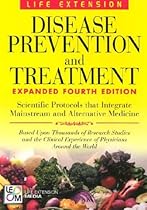 Many of the b vitamins assist in maximizing production from the Krebs's cycle, but pethaps none is as efficient as lipoic acid (Challem et al. 2000).
Note: Free radicals are produced as a byproduct of the energy generated during the Krebs's cycle. Alpha-lipoic acid appears to quench free radicals that are not contained during the reactions.
As glucose is provided to fuel the Ktebs's cycle, blood glucose and insulin levels dectease and simultaneously anothet perk occurs: insulin sensitivity increases. Many of the b vitamins assist in maximizing production from the Krebs's cycle, but pethaps none is as efficient as lipoic acid (Challem et al. 2000).
Note: Free radicals are produced as a byproduct of the energy generated during the Krebs's cycle. Alpha-lipoic acid appears to quench free radicals that are not contained during the reactions.
As glucose is provided to fuel the Ktebs's cycle, blood glucose and insulin levels dectease and simultaneously anothet perk occurs: insulin sensitivity increases. |
Gary Null
See book keywords and concepts |
| A balanced complex of the b vitamins is also essential for energy and for proper production of hormones. One recent study determined not only that low folate (a B vitamin) levels are associated with cognitive deficits, but also that patients treated with folic acid for sixty days showed a significant improvement in both memory and attention.9
In a six-year study to determine the relationship between nutritional status and cognitive performance, 137 elderly people were studied and several significant associations were observed between cognition and vitamin status. |
| The elderly usually require greater amounts of these substances—such as b vitamins, to improve memory function—and should utilize them as needed to promote healthful aging.
As we shall see, by promoting rejuvenation, nutrients can diminish or even eliminate a dependence on multiple medications, which has become a way of life for most senior citizens. The drugs on which elders rely on a daily basis have serious limitations: They do not correct the underlying cause of disease processes and, therefore, do not reverse illness; they may have dangerous side effects; they are also costly. |
| Reduced hydrochloric acid has an enormous impact on your ability to absorb several b vitamins. As a result, we find lower levels of vitamin B12 and folic acid in the blood of older people, and subsequently there is a greater need on their part for these nutrients.
Research at the University of Alabama in Birmingham and at Tufts University finds that folic acid aids in the prevention of stroke, as well as heart disease. People who consume the most folate (within usual dosages) are 50 percent less likely to have narrowing of the carotid artery leading to the brain.
Holding Homocysteine at Bay. |
David Hoffman, FNIMH, AHG
See book keywords and concepts |
 These foods are high in fiber and b vitamins and release sugar slowly.
Increase potassium-rich foods, including sunflower seeds, dates, figs, peaches, bananas, and tomatoes. These may help prevent water retention.
Increase intake of natural diuretics, which include artichokes, asparagus, parsley, and watercress.
Researcher David Horrobin advocates the use of gamma linolenic acid (GLA). GLA is found naturally in human milk, evening primrose oil, and a few other plant oils. (See chapter 5 for more information. These foods are high in fiber and b vitamins and release sugar slowly.
Increase potassium-rich foods, including sunflower seeds, dates, figs, peaches, bananas, and tomatoes. These may help prevent water retention.
Increase intake of natural diuretics, which include artichokes, asparagus, parsley, and watercress.
Researcher David Horrobin advocates the use of gamma linolenic acid (GLA). GLA is found naturally in human milk, evening primrose oil, and a few other plant oils. (See chapter 5 for more information. |
Earl L. Mindell, RPh, PhD with Virginia Hopkins, MA
See book keywords and concepts |
| One of these villains is high homocysteine levels, often caused by a deficiency of b vitamins. Another such villain is rancid oil, such as unsaturated vegetable oils teeming with unstable molecules. The partially hydrogenated vegetable oils are equally if not more toxic to the heart.
Low magnesium levels do damage by weakening the heart muscles and interfering with nerve impulses and heartbeat.
And we all know by now that lack of exercise, depression, and high levels of chronic, unresolved stress are potent risk factors for heart disease.
Why Does Cholesterol Accumulate in the Arteries? |
| A thick mucous layer protects the stomach walls from harm as the acid kills bacteria and parasites and frees up minerals (such as magnesium and potassium) and the b vitamins folate and B12 so that they can be absorbed in the small intestine.
If sufficient stomach acid isn't produced, digestion suffers. The passage of food out of the stomach into the small intestine is delayed, which can lead to heartburn as the stomach pushes food mixed with acid back into the esophagus. |
| They manufacture the b vitamins. They help us digest our food, reduce cholesterol, and help keep hormones in balance. If you take an antibiotic and kill them off, it will seriously compromise your health. Steroids such as prednisone, poor digestion, nutritional deficiencies, and stress can also kill off these good bacteria, leaving an overgrowth of the bad guys, most of whom are a fungal yeast called
Candida albicans. |
Walter Last
See book keywords and concepts |
 Starches need b vitamins, chlorides, calcium, and magnesium for enzyme activation.
• Sweeteners or sugars as well as acids inhibit the digestion of starches.
Disregarding these facts by mixing foods indiscriminately may contribute to infections and degenerative diseases, especially allergies, arthritis, cancer, and autoimmune diseases.
Initially, most people have a reasonably strong digestive system and do not feel any ill effects, no matter what they eat or combine. This is also true if bodily responses have become dulled by being ignored for many years. Starches need b vitamins, chlorides, calcium, and magnesium for enzyme activation.
• Sweeteners or sugars as well as acids inhibit the digestion of starches.
Disregarding these facts by mixing foods indiscriminately may contribute to infections and degenerative diseases, especially allergies, arthritis, cancer, and autoimmune diseases.
Initially, most people have a reasonably strong digestive system and do not feel any ill effects, no matter what they eat or combine. This is also true if bodily responses have become dulled by being ignored for many years. |
Gary Null
See book keywords and concepts |
| Known antioxidants include:
• Vitamin C
• Vitamin E
• Some b vitamins, beta-carotene (use mixed carotenoids)
• Alpha-lipoic acid
• Manganese
• Selenium
• Zinc
• Some amino acids, such as L-carnosine, N-acetyl cysteine (NAC), and L-taurine, reduced L-glutathione
• Coenzyme Q10 (coQIO)
• Some hormones, such as melatonin
• Some enzymes, such as superoxide dismutase (SOD)
The Antioxidant Army may be compared to the pieces of a chess set. |
Walter Last
See book keywords and concepts |
 The bacteria among our intestinal flora supply a considerable part of our b vitamins. Unfortunately, antibiotics destroy these essential bacteria and can cause vitamin deficiencies. For this reason, use fermented foods or cultures containing acidophilus and bifidobacteria and take B-vitamin supplements whenever you take antibiotics. Other widespread conditions causing persistent vitamin deficiencies and dependencies are deprivations during fetal development and, in later life, acute and chronic infections, parasites, and inefficient metabolism. The bacteria among our intestinal flora supply a considerable part of our b vitamins. Unfortunately, antibiotics destroy these essential bacteria and can cause vitamin deficiencies. For this reason, use fermented foods or cultures containing acidophilus and bifidobacteria and take B-vitamin supplements whenever you take antibiotics. Other widespread conditions causing persistent vitamin deficiencies and dependencies are deprivations during fetal development and, in later life, acute and chronic infections, parasites, and inefficient metabolism. |
Gary Null
See book keywords and concepts |
| Several studies find that higher blood concentrations of b vitamins contribute to lower concentrations of homocysteine. The AHA also notes that other evidence ties low blood levels of folic acid to a higher risk of fatal cardiac disease and stroke. Clinical research is expanding on several continents to determine whether the lowering of homocysteine by vitamin B and folic acid leads to a decrease in cardiovascular disease over time.
Vegetables (especially cabbage, raw spinach, endive, and asparagus), whole grains, citrus fruit, papaya, and tomatoes are rich sources of folic acid. |
Patrick Holford
See book keywords and concepts |
 Like other seeds, it's rich in essential fats, vitamins, and minerals, providing almost four times as much calcium as wheat, plus extra iron, b vitamins, and vitamin E. Quinoa is also low in fat: the majority of its oil is polyunsaturated, providing essential fatty acids. Quinoa is about as close to a perfect food as you can get.
Quinoa can be found in many health food stores and used as an alternative to rice. To cook it, rinse well, then add two parts water to one of quinoa and boil for fifteen minutes.
Meat
The average person in the U.S. eats over 200 pounds of meat each year. Like other seeds, it's rich in essential fats, vitamins, and minerals, providing almost four times as much calcium as wheat, plus extra iron, b vitamins, and vitamin E. Quinoa is also low in fat: the majority of its oil is polyunsaturated, providing essential fatty acids. Quinoa is about as close to a perfect food as you can get.
Quinoa can be found in many health food stores and used as an alternative to rice. To cook it, rinse well, then add two parts water to one of quinoa and boil for fifteen minutes.
Meat
The average person in the U.S. eats over 200 pounds of meat each year. |
Earl L. Mindell, RPh, PhD with Virginia Hopkins, MA
See book keywords and concepts |
| It's best to take the b vitamins together.)
Be sure you're getting both beta-carotene and vitamin A in your multivitamin formula.
Other Tips on These Drugs They can skew the results of many blood and urine tests. Take them with food or they may upset your stomach.
Potassium-Sparing Diuretics
Amiloride (Midamor) Spironolactone (Aldactone)
Triamterene (Dyrenium) Combinations (Dyazide, Moduretic, Aldactazide, Maxzide)
The potassium-sparing diuretics are usually combined with one of the other diuretics to reduce excessive potassium depletion. |
| If you have a deficiency of certain b vitamins or a genetic predisposition that interferes with the metabolism of homocysteine, the levels of it in your blood will rise, and so will your risk of heart disease and stroke.
Excess homocysteine directly harms the cells that line the insides of the arteries, starting (and encouraging) the process that leads to heart attacks and strokes. In fact, when it's injected into the arteries of experimental animals, homocysteine causes the linings of those arteries to literally slough off. |
David Hoffman, FNIMH, AHG
See book keywords and concepts |
 In addition, adequate intake of b vitamins is essential.
Nutritional Guidelines
A healthy diet provides optimal amounts of all known nutrients and low levels of components that are detrimental to health. It is rich in whole, unprocessed foods and especially high in plant foods—fruits, vegetables, grains, beans, seeds, and nuts. While it is impossible to come up with a detailed set of guidelines for everyone, consider the following elements of a healthy diet.
• Eat fresh, nutritious foods in season, in a form as close as possible to the original. In addition, adequate intake of b vitamins is essential.
Nutritional Guidelines
A healthy diet provides optimal amounts of all known nutrients and low levels of components that are detrimental to health. It is rich in whole, unprocessed foods and especially high in plant foods—fruits, vegetables, grains, beans, seeds, and nuts. While it is impossible to come up with a detailed set of guidelines for everyone, consider the following elements of a healthy diet.
• Eat fresh, nutritious foods in season, in a form as close as possible to the original. |
Walter Last
See book keywords and concepts |
 Vitamin supplements can protect us from these dangers: In addition to PABA and other b vitamins, we need plenty of antioxidants, bioflavonoids, and carotenoids for sun protection. Except for zinc cream or a solution of PABA, I am not in favor of using sunscreen lotions; instead, use suitable clothing for protection. Sunscreens contain unbio-logical chemicals, and it has been reported that most commercial sunscreens kill skin cells and so may inflict long-term skin damage. Vitamin supplements can protect us from these dangers: In addition to PABA and other b vitamins, we need plenty of antioxidants, bioflavonoids, and carotenoids for sun protection. Except for zinc cream or a solution of PABA, I am not in favor of using sunscreen lotions; instead, use suitable clothing for protection. Sunscreens contain unbio-logical chemicals, and it has been reported that most commercial sunscreens kill skin cells and so may inflict long-term skin damage. |
Linda B. White, M.D.
See book keywords and concepts |
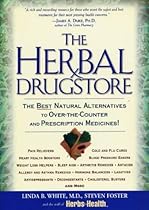 This not only supplies zinc but also soaks up alcohol in the stomach, allowing it to be absorbed more slowly.
ž b vitamins. The whole complex of these nutrients tends to be depleted in those who drink frequently. Like zinc, b vitamins are used by the enzymes that metabolize alcohol. Take a product that supplies at least 50 milligrams of each B vitamin (thiamine, niacin, B6, B12) and 100 micrograms of folic acid after drinking.
ž Vitamin C. This antioxidant may help in the breakdown and removal of alcohol from the body. This not only supplies zinc but also soaks up alcohol in the stomach, allowing it to be absorbed more slowly.
ž b vitamins. The whole complex of these nutrients tends to be depleted in those who drink frequently. Like zinc, b vitamins are used by the enzymes that metabolize alcohol. Take a product that supplies at least 50 milligrams of each B vitamin (thiamine, niacin, B6, B12) and 100 micrograms of folic acid after drinking.
ž Vitamin C. This antioxidant may help in the breakdown and removal of alcohol from the body. |
Phyllis A. Balch, CNC
See book keywords and concepts |
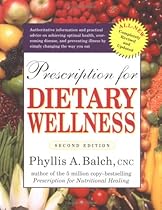 Key nutrients in corn include protein, fiber, vitamin A, b vitamins, vitamin C, calcium, folate, magnesium, phosphorus, potassium, and iron. Phytochemicals include alpha-carotene, phytosterols, phytic acid, and phytoestrogens.
Jerusalem Artichoke
Known also as the sunchoke, the Jerusalem artichoke is a tuberous vegetable of the sunflower family. Its underground stem, which resembles ginger root or a small knobby potato, can be dehydrated and ground into flour. Popular in pasta, Jerusalem artichoke flour has a slightly sweet and nutty flavor. Key nutrients in corn include protein, fiber, vitamin A, b vitamins, vitamin C, calcium, folate, magnesium, phosphorus, potassium, and iron. Phytochemicals include alpha-carotene, phytosterols, phytic acid, and phytoestrogens.
Jerusalem Artichoke
Known also as the sunchoke, the Jerusalem artichoke is a tuberous vegetable of the sunflower family. Its underground stem, which resembles ginger root or a small knobby potato, can be dehydrated and ground into flour. Popular in pasta, Jerusalem artichoke flour has a slightly sweet and nutty flavor. |
Michael Lerner
See book keywords and concepts |
 Tannenbaum's studies in the 1950s, which played a key role in establishing that "underfeeding" reduced the incidence and yield of tumors in animals, nonetheless found no significant differences in the frequency of tumors in animals fed high, medium, and low levels of b vitamins.21
As with other vitamins, the synergistic effects of specific b vitamins and other nutrients can be striking. Tannenbaum's studies in the 1950s, which played a key role in establishing that "underfeeding" reduced the incidence and yield of tumors in animals, nonetheless found no significant differences in the frequency of tumors in animals fed high, medium, and low levels of b vitamins.21
As with other vitamins, the synergistic effects of specific b vitamins and other nutrients can be striking. |
Dr. Michael Heinrich, Joanne Barnes, Simon Gibbons and Elizabeth M. Williamson
See book keywords and concepts |
 Tannins and phenolics, including catechin, epicatechin, kolatin, kolatein, kolanin, and amines, including dimethylamine, methylamine, ethylamine and isopentylamine, are also present, together with thiamine and other b vitamins.
Pharmacological effects and clinical efficacy
Caffeine is a mild stimulant and has diuretic properties; cola extracts are also astringent and antidiarrhoeal due to the tannin content. Cola extracts are an ingredient of many tonics for depression and tiredness and to stimulate the appetite. Tannins and phenolics, including catechin, epicatechin, kolatin, kolatein, kolanin, and amines, including dimethylamine, methylamine, ethylamine and isopentylamine, are also present, together with thiamine and other b vitamins.
Pharmacological effects and clinical efficacy
Caffeine is a mild stimulant and has diuretic properties; cola extracts are also astringent and antidiarrhoeal due to the tannin content. Cola extracts are an ingredient of many tonics for depression and tiredness and to stimulate the appetite. |
Mike Adams, the Health Ranger
See article keywords and concepts |
 Often it's called a genetic defect or a birth defect; but far more often than not, this is really just the lack of fitness of the heart muscle due to chronic malnutrition, typically a lack of b vitamins.
So, if you think about it, any muscle in the body that isn't fit, that doesn't have good nutrition and plenty of hydration, will lose its tone, and muscles will begin to sag or deform or not have the structural strength they once had. Often it's called a genetic defect or a birth defect; but far more often than not, this is really just the lack of fitness of the heart muscle due to chronic malnutrition, typically a lack of b vitamins.
So, if you think about it, any muscle in the body that isn't fit, that doesn't have good nutrition and plenty of hydration, will lose its tone, and muscles will begin to sag or deform or not have the structural strength they once had. |
Ronald Klatz and Robert Goldman
See book keywords and concepts |
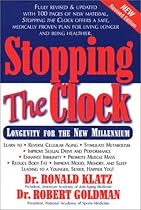 STRESS AND B VITAMINS
Another group of supplements to consider taking for stress are the b vitamins. When we become stressed, these vitamins are rapidly depleted from our system. Therefore, it's necessary that we replace them daily for proper functioning.
You may have heard people say "My nerves are frazzled," or "My nerves are shot," when they talk about the stress they're under. Stress indeed affects the parts of the body related to the nervous system—especially the digestive and intestinal systems. It places the entire body under siege, also weakening the immune system tremendously. STRESS AND B VITAMINS
Another group of supplements to consider taking for stress are the b vitamins. When we become stressed, these vitamins are rapidly depleted from our system. Therefore, it's necessary that we replace them daily for proper functioning.
You may have heard people say "My nerves are frazzled," or "My nerves are shot," when they talk about the stress they're under. Stress indeed affects the parts of the body related to the nervous system—especially the digestive and intestinal systems. It places the entire body under siege, also weakening the immune system tremendously. |
Mike Adams, the Health Ranger
See article keywords and concepts |
 And of course, b vitamins are water soluble vitamins.
Moving on in the herbs category, of course there are many, many healing herbs for heart health, including herbs like garlic, onions, and juniper berries. But I think that the big solution here when it comes to avoiding atherosclerosis, and doing what many people describe as unclogging their arteries, really comes down to avoiding hydrogenated oils, fried foods, and trans fatty acids.
This is a disorder for which avoidance is really the best treatment. And of course, b vitamins are water soluble vitamins.
Moving on in the herbs category, of course there are many, many healing herbs for heart health, including herbs like garlic, onions, and juniper berries. But I think that the big solution here when it comes to avoiding atherosclerosis, and doing what many people describe as unclogging their arteries, really comes down to avoiding hydrogenated oils, fried foods, and trans fatty acids.
This is a disorder for which avoidance is really the best treatment. |
Laurie Deutsch Mozian, M.S., R.D.
See book keywords and concepts |
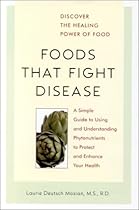 Be sure to eat lots of foods rich in these b vitamins to stave off heart disease. You should take in 400 micrograms of folic acid and 3 milligrams of vitamin BD daily. This is about double the current RDA for those vitamins. Current clinical studies indicate a reduced risk of cardiovascular disease in people whose intake of these two b vitamins is at this level. The table below and the one following list some of the most folic-acid-and vitamin-B6-rich foods.
Pectin-Rich Foods
Foods rich in pectin include apples, pears, citrus fruits, and berries. Be sure to eat lots of foods rich in these b vitamins to stave off heart disease. You should take in 400 micrograms of folic acid and 3 milligrams of vitamin BD daily. This is about double the current RDA for those vitamins. Current clinical studies indicate a reduced risk of cardiovascular disease in people whose intake of these two b vitamins is at this level. The table below and the one following list some of the most folic-acid-and vitamin-B6-rich foods.
Pectin-Rich Foods
Foods rich in pectin include apples, pears, citrus fruits, and berries. |
Mike Adams, the Health Ranger
See article keywords and concepts |
 Interestingly, most Americans are, today, deficient in b vitamins as well, making them technically rednecks. It also explains why many people are so easily sunburned. As explained in Staying Healthy With Nutrition by Dr. Elson Haas, M.D.:
For a long period of history, the niacin deficiency disease, pellagra, was a very serious and fatal problem. Characterized as the disease of the "three Ds," pellagra causes its victims to experience dermatitis, diarrhea, and dementia. The fourth D was death. Interestingly, most Americans are, today, deficient in b vitamins as well, making them technically rednecks. It also explains why many people are so easily sunburned. As explained in Staying Healthy With Nutrition by Dr. Elson Haas, M.D.:
For a long period of history, the niacin deficiency disease, pellagra, was a very serious and fatal problem. Characterized as the disease of the "three Ds," pellagra causes its victims to experience dermatitis, diarrhea, and dementia. The fourth D was death. |












